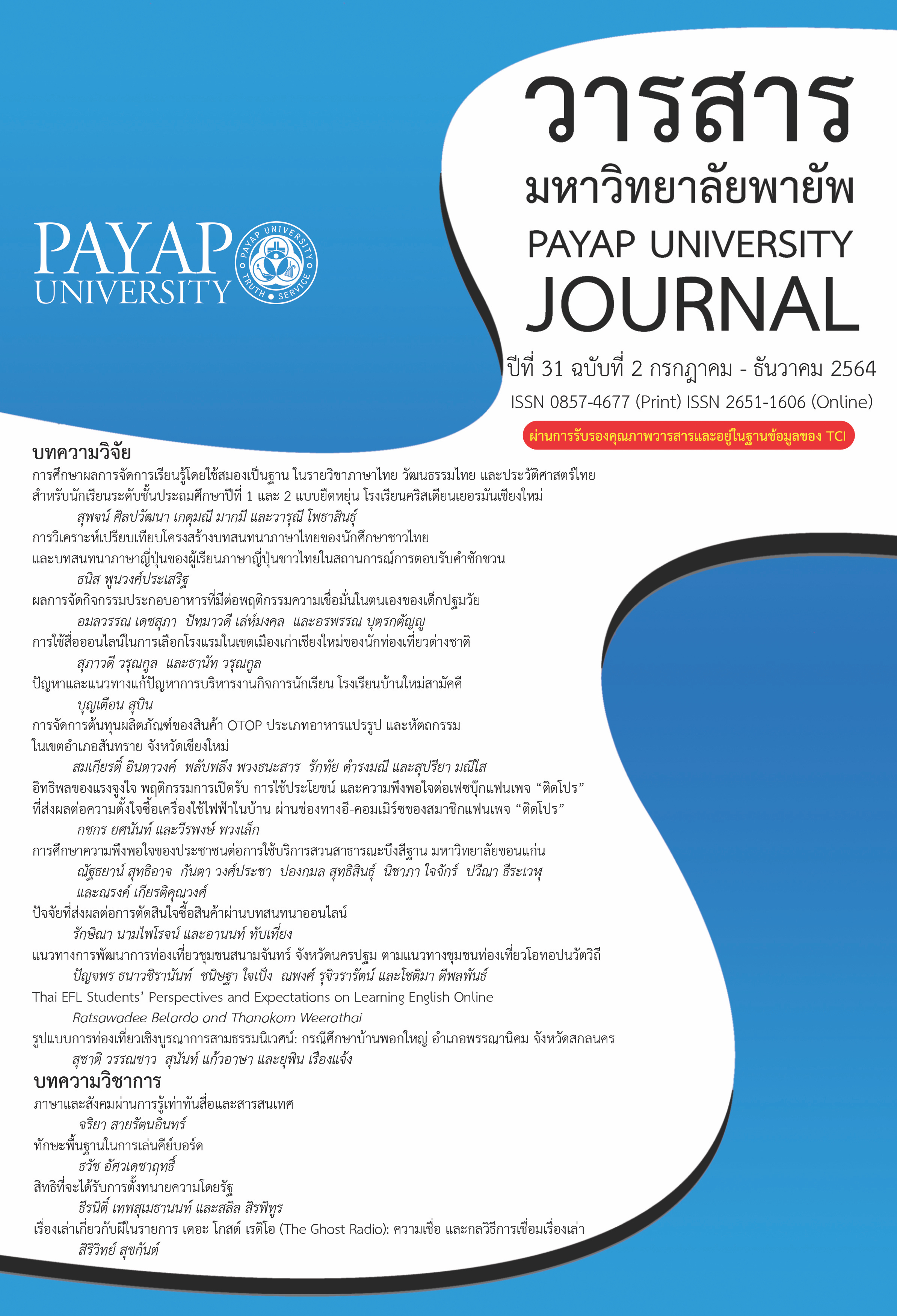การใช้สื่อออนไลน์ในการเลือกโรงแรมในเขตเมืองเก่าเชียงใหม่ของนักท่องเที่ยวต่างชาติ
Main Article Content
บทคัดย่อ
งานวิจัยนี้ ศึกษาพฤติกรรมและแนวทางการเลือกของนักท่องเที่ยวต่างชาติผ่านการใช้สื่อออนไลน์เลือกโรงแรมในเขตเมืองเก่า จังหวัดเชียงใหม่ เพื่อการจัดการธุรกิจโรงแรมให้มีประสิทธิภาพ ทฤษฎีปัจจัยส่วนประสมการตลาดบริการ (7Ps) ประกอบด้วย ผลิตภัณฑ์ ราคา สถานที่ การส่งเสริมการขาย บุคลากร กระบวนการ และลักษณะทางกายภาพ ถูกนำมาวิเคราะห์เพื่อการตัดสินใจเลือกโรงแรม จากจำนวนนักท่องเที่ยวต่างชาติ 139 ราย 81 โรงแรมในเขตเมืองเก่าจังหวัดเชียงใหม่ การวิเคราะห์แบบสอบถามใช้สถิติเชิงพรรณนา หาค่าเฉลี่ยของปัจจัยแต่ละด้าน ผลการศึกษาพบว่าปัจจัยที่มีน้ำหนักความสำคัญต่อการเลือกของนักท่องเที่ยวต่างชาติมากที่สุดเป็นลักษณะทางกายภาพ โดยเฉพาะรูปแบบโรงแรมที่แสดงเอกลักษณ์ของศิลปกรรมท้องถิ่น จะดึงดูดความสนใจเลือกมากที่สุด ปัจจัยด้านรองลงมาคือ การระบุราคาสุทธิชัดเจน รับรู้ได้ถึงความคุ้มค่าเงินที่ต้องจ่าย ส่วนปัจจัยลำดับที่ 3-7 เรียงตามค่าน้ำหนักดังนี้ กระบวนการผลิตภัณฑ์ สถานที่ บุคลากร และการส่งเสริมการขาย สรุปได้ว่านักท่องเที่ยวต่างชาติที่จองโรงแรมในเขตเมืองเก่าเชียงใหม่ผ่านสื่อออนไลน์จะเลือกจากภาพที่ปรากฏ ความเหมาะสมของราคาขั้นตอนจองไม่ซับซ้อน แสดงที่ตั้งสะดวกต่อการท่องเที่ยว และมีคำบรรยายข้อคิดเห็นของผู้ที่เคยพัก
Article Details
เอกสารอ้างอิง
กระทรวงการท่องเที่ยวและกีฬา. (2562). จำนวนและรายได้นักท่องเที่ยวต่างชาติ, สืบค้นเมื่อ
สิงหาคม 2564. https://www.mots.go.th/more_news_new.php?cid=585.
Aeknarjindawat, N. (2019). The factors influencing tourists' online hotel reservations in Thailand: An empirical study. International Journal of Innovation, Creativity and Change, 10(1), 121-136.
Anjani, H. D., Irham, and Waluyati, L. R. (2018). Relationship of 7P marketing mix and consumers' loyalty in traditional markets. Agro Ekonomi, 29(2), 261-273.
Cruz-Milan, O. (2021). Hotels' marketing mix responses at insecurity-stricken destinations: A study in the US-Mexico border. International Hospitality Review, EarlyCite Issue, 1-25.
Kwok, L., Tang, Y., and Yu, B. (2020). The 7 Ps marketing mix of home-sharing services: Mining travelers' online reviews on Airbnb. International Journal of Hospitality Management, 90, 1-11.
Loo, P. T., & Leung, R. (2018). A service failure framework of hotels in Taiwan: Adaptation of 7Ps marketing mix elements. Journal of Vacation Marketing, 24(1), 79-100.
Lovelock, C., & Wirtz, J. (2010). Services marketing: People, technology, strategy (7th ed.). Boston: Prentice Hall.
Radder, L., & Wang, Y. (2006). Dimensions of guest house service: Managers' perceptions and business travellers' expectations. International Journal of Contemporary Hospitality Management, 18(7), 554-562.
Rafiq, M., & Ahmed, P.K. (1995). Using the 7Ps as a generic marketing mix: An exploratory survey of UK and European marketing academics. Marketing Intelligence & Planning, 13(9), 4-15.
Salman, D., Tawfix, Y., Samy, M., & Artal-Tur, A. (2017). A new marketing mix model to rescue the hospitality industry: Evidence from Egypt after the Arab spring. Future Business Journal, 3(1), 47-69.
Shummadtayar, U. & Ongsavangchai, N. (2018). Urbanization and urban context variants of old districts in Chiang Mai. Journal of Environmental Design, 5(1), 60-81.
SiteMinder. (2021). Top 12 hotel booking channels of 2020, Retrieved August 29, 2021. from https://insights.ehotelier.com/suppliers/2021/02/04/top-12-hotel-booking-channels-of-2020/
Teng, Y. M., Wu, K. S., and Chou, C. Y. (2020). Price or convenience: What is more important for online and offline bookings? A study of a five-star resort hotel in Taiwan. Sustainability, 12(10), 1-16.


